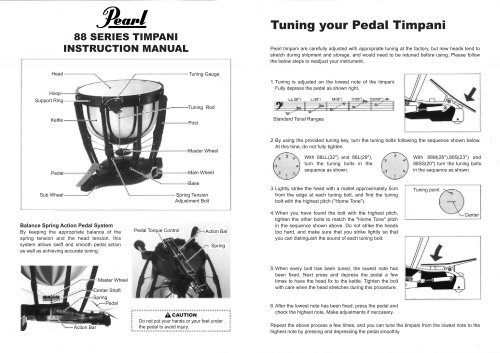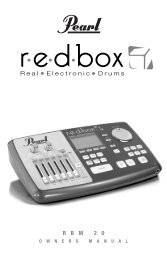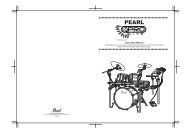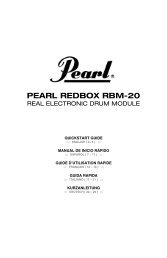Tuning your Pedal Timpani - Pearl Music Europe
Tuning your Pedal Timpani - Pearl Music Europe
Tuning your Pedal Timpani - Pearl Music Europe
You also want an ePaper? Increase the reach of your titles
YUMPU automatically turns print PDFs into web optimized ePapers that Google loves.
Head<br />
Hoop<br />
Support Ring<br />
Kettle<br />
<strong>Pedal</strong><br />
Sub Wheel<br />
88 SERIES TIMPANI<br />
INSTRUCTION MANUAL<br />
Balance Spring Action <strong>Pedal</strong> System<br />
By keeping the appropriate balance of the<br />
spring tension and the head tension, this<br />
system allows swift and smooth pedal action<br />
as well as achieving accurate tuning.<br />
Action Bar<br />
Master Wheel<br />
Center Shaft<br />
Spring<br />
<strong>Pedal</strong><br />
<strong>Pedal</strong> Torque Control<br />
<strong>Tuning</strong> Gauge<br />
<strong>Tuning</strong> Rod<br />
Post<br />
Master Wheel<br />
Main Wheel<br />
Base<br />
Spring Tension<br />
Adjustment Bolt<br />
Action Bar<br />
Spring<br />
CAUTION<br />
Do not put <strong>your</strong> hands or <strong>your</strong> feet under<br />
the pedal to avoid injury.<br />
<strong>Tuning</strong> <strong>your</strong> <strong>Pedal</strong> <strong>Timpani</strong><br />
<strong>Pearl</strong> timpani are carefully adjusted with appropriate tuning at the factory, but new heads tend to<br />
stretch during shipment and storage, and would need to be retuned before using. Please follow<br />
the below steps to readjust <strong>your</strong> instrument.<br />
1. <strong>Tuning</strong> is adjusted on the lowest note of the timpani.<br />
Fully depress the pedal as shown right.<br />
Standard Tonal Ranges<br />
2. By using the provided tuning key, turn the tuning bolts following the sequence shown below.<br />
At this time, do not fully tighten.<br />
With 88LL(32") and 88L(29"),<br />
turn the tuning bolts in the<br />
sequence as shown.<br />
3. Lightly strike the head with a mallet approximately 5cm<br />
from the edge at each tuning bolt, and find the tuning<br />
bolt with the highest pitch ("Home Tone").<br />
4. When you have found the bolt with the highest pitch,<br />
tighten the other bolts to match the "Home Tone" pitch<br />
in the sequence shown above. Do not strike the heads<br />
too hard, and make sure that you strike lightly so that<br />
you can distinguish the sound of each tuning bolt.<br />
5. When every bolt has been tuned, the lowest note has<br />
been fixed. Next press and depress the pedal a few<br />
times to have the head fix to the kettle. Tighten the bolt<br />
with care when the head stretches during this procedure.<br />
6. After the lowest note has been fixed, press the pedal and<br />
check the highest note. Make adjustments if neccesary.<br />
With 88M(26"),88S(23") and<br />
88SS(20") turn the tuning bolts<br />
in the sequence as shown.<br />
<strong>Tuning</strong> point<br />
Center<br />
Repeat the above process a few times, and you can tune the timpani from the lowest note to the<br />
highest note by pressing and depressing the pedal smoothly.
Replacing the Head<br />
1. Place <strong>your</strong> foot on the pedal and loosen the<br />
tuning bolts in the sequence previously<br />
mentioned. Do not turn the bolts at once<br />
and loosen by 1/2 or 1/4 of a turn.<br />
CAUTION<br />
When you loosen the<br />
tuning bolts, the pedal<br />
will suddenly be pulled<br />
down. Place a tennis<br />
ball under the pedal to<br />
prevent injury.<br />
Place a<br />
Tennis Ball<br />
2. When you have all the tension rods<br />
unscrewed, remove the head off with the hoop.<br />
3. Place the new head to<br />
the kettle. Make sure<br />
that the head is in the<br />
center of the kettle.<br />
Correct position;<br />
head in center<br />
Kettle<br />
Wrong position;<br />
head off center<br />
<strong>Tuning</strong> Gauge (TG-50)<br />
The <strong>Tuning</strong> Gauge equipped on the 88 series<br />
timpani shows where to set the pedal for each<br />
note.<br />
The Tone Mark is set depending on the<br />
timapni size and the position can be adjusted<br />
to match the position of the Pointer.<br />
The Pointer is adjusted at the factory. Make<br />
sure that it moves from the highest tone to the<br />
lowest tone, and make adjustments on the<br />
position of the Tone Marks if neccesary.<br />
If the Pointer does not move in the correct<br />
radius, adjust by loosening the Adjustment<br />
Screw with the provided Allen wrench. Make<br />
sure to retighten after adjustment.<br />
If the Pointer moves out of the radius, loosen<br />
the nut on the Link Ball, and move the <strong>Tuning</strong><br />
Rod to the right<br />
4.Put the hoop back on and turn the tuning<br />
bolts. Follow the procedures previously<br />
mentioned in "<strong>Tuning</strong> <strong>your</strong> <strong>Pedal</strong> <strong>Timpani</strong>"<br />
and have <strong>your</strong> timpani fine-tuned<br />
NOTE<br />
It is recommended that the heads should be<br />
replaced at least once in two years.<br />
The head size should be 2" larger than the<br />
kettle size.<br />
For example, 88M (26") should have 28"<br />
heads<br />
Adjustment<br />
Screw<br />
Pointer<br />
Tone Mark<br />
Link Ball<br />
Adjustment<br />
Arm<br />
<strong>Tuning</strong> Rod<br />
<strong>Pedal</strong> Torque<br />
Adjustment<br />
The pedal is adjusted at the factory, but can<br />
be adjusted for lighter or heavier feel. Turn<br />
the Torque Adjustment Screw clock wise<br />
with the provided Allen wrench.<br />
CAUTION<br />
The pedal is adjusted at the lightest feel at<br />
the factory. Do not turn anti clockwise.<br />
Forcing the screw to turn with tools other<br />
than provided will cause damage.<br />
This system is not to fix the position of the<br />
pedal. Do not force to turn the screw over<br />
an extent.<br />
Torque<br />
Adjustment<br />
Screw<br />
Action Bar<br />
Spring Tension Adjustment Bolt<br />
Spring Tension<br />
Adjustment<br />
The pedal spring tension can be adjusted<br />
by turning the Spring Tension Adjustment<br />
Bolt. Turn the bolt clockwise for stronger<br />
tension when the toe part of the pedal rises.<br />
Turn the bolt anti clockwise for weaker<br />
tension when the heel part of the pedal<br />
rises.<br />
Maintenance<br />
Kettle<br />
The kettle is very fragile. Take extra caution<br />
and prevent any damage or harm to the<br />
kettle.<br />
Use soft cloth to wipe off any dirt. Use extra<br />
care and do not wipe with strength.<br />
Head<br />
After using the instrument, press the pedal so<br />
that the pointer comes to the middle of the<br />
gauge. When you are not using the<br />
instrument for a long time, press the pedal<br />
fully on the heel side to be tuned at the lowest<br />
note.<br />
Make sure to wipe the head after use,<br />
especially where you hands have touched.<br />
Do not forget to place the head protection<br />
cover included to protect the heads.







